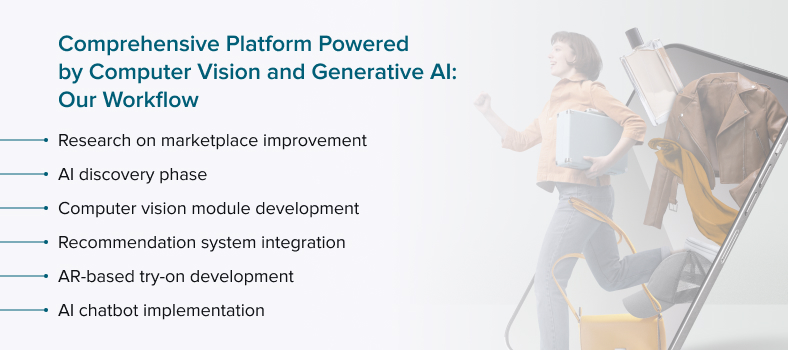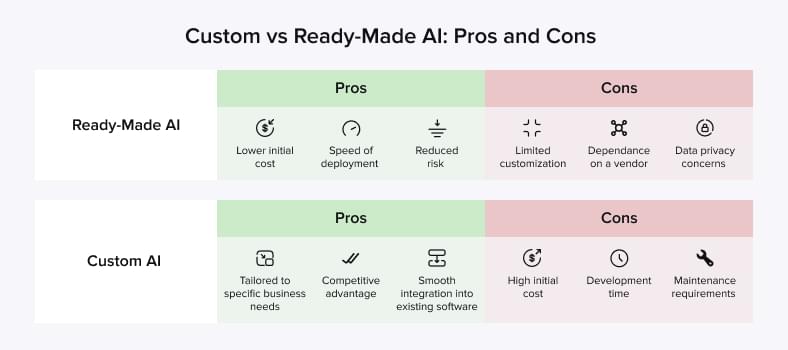Retail has been using artificial intelligence for years, leading to faster, more efficient, and more accurate operations. However, 2 out of 5 retailers today cite budget constraints as a major barrier to AI adoption, and 21% admit they do not have the expertise to manage the technology.
Indeed, building an artificial intelligence product from the ground up can be expensive and time-consuming. But it is not the only option. The smart tech market has plenty of ready-to-use products to enhance your retail operations and offer a solid alternative to custom AI solutions.
Let us dive into the “build vs buy” debate for AI implementation, weigh the pros and cons of each approach, and determine when to use which. For a clear and more vivid illustration, we will use a real-life example from our portfolio: an AI-powered mobile app we developed for a top US beauty retailer.
This article is a part of the “AI in retail” series, where we showcase all aspects of AI implementation for small and mid-sized businesses. Read more materials from this series:
– How retailers benefit from AI innovations;
– AI in retail trends and challenges to solve;
– AI use cases for the e-commerce niche;
– AI implementation in physical stores;
– What to consider before AI implementation in retail.
How to Mix Computer Vision and GPT for Outstanding Business Results: Our Experience
In late 2021, a leading US retailer with a network of brick-and-mortar stores nationwide and a robust online presence approached us with an ambitious idea of an AI-driven mobile app.
They envisioned a unique, comprehensive smart assistant for both online and in-store shoppers right in their pockets. The company aimed to enhance customer support, revolutionize shoppers’ experience, and step ahead of the competition.
Their chosen strategy? To build a fresh AI-centric mobile app from scratch, partnering with vetted AI/ML experts. And so, our journey began!

Step by step, we crafted a comprehensive app packed with intelligent features that assisted shoppers in selecting, locating, and purchasing products online and in physical stores. The list of features included:
- Revolutionary virtual fitting room for makeup products;
- Hyper-personalized recommendation system based on face features analysis;
- Trend analysis system that gives tips on fashion trends and suggests products;
- Interactive chatbot powered by the GPT model;
- Order tracking system;
- Inventory and store locator;
- Online surveys for shoppers.
Starting an AI project can be hectic! Here are 10 things you should consider
Read more
Using the app, customers can browse products, virtually try them on, experiment with styles, receive personalized recommendations, buy products online, or locate a nearby store.
It took nearly two years, with a dedicated team of AI engineers, software developers, designers, and managers working tirelessly. We rolled out the product in phases, introducing features incrementally, refining the model, and fine-tuning the product to meet the client’s needs.
As a result, the game-changing functionality was warmly received on the market. The app not only generated significant buzz but also delivered tangible business results:
- Enhanced customer support: with the app, shoppers can convey their needs and preferences 24/7;
- Impressive customer engagement: more than ten million people downloaded the app;
- Improved sales conversion: because of personalized suggestions, the sales conversion rate rose by 38%;
- Data-driven insights: AI analysis system processes customer data and effectively supports marketing and product development decisions.
We’re gladly sharing more of this case study on our website. Follow this link for tech stack and workflow insights.
As you can see, creating a custom AI solution demands significant resources, but it is geared toward groundbreaking results. The investment truly pays off with the right partner.
Ready-Made AI: How It Would Be Different
Let us imagine a situation where our client chose an off-the-shelf AI solution to achieve the same functionalities. How would this scenario play out?
They might employ several ready-made solutions: one for virtual makeup try-ons, another as an interactive chatbot, and yet another for personal recommendations. Let us delve into the pros and cons of this approach.

Benefits of Ready-Made AI Solutions for Retail
Faster Deployment
Crafting an AI model from scratch entails comprehensive research, development, testing, training, and refinement. Meanwhile, a market-ready product has already undergone these phases and is ready for deployment.
Lower Cost
Creating custom AI involves significant upfront costs of hardware, software, and an expert team. In contrast, many market solutions are available on a subscription basis, significantly easing the financial burden for their business users.
What AI technologies can your use to optimize business reporting and analytics?
Read more
Good Reliability for Common Use Cases
Ready-made solutions are trained on extensive datasets and are often very good at handling generic tasks. These tools can easily manage functionality like order tracking or locating the nearest store.
Flexibility and Low AI Commitment
If our client had aimed for a basic introduction to AI instead of deep integration, an off-the-shelf solution would have been ideal. It offers a chance to tap into AI advantages without heavy investments or long-term commitments.
Low Risks
Starting an AI project from scratch carries risks of uncertain outcomes. In contrast, off-the-shelf solutions offer a proven track record. Clients can see firsthand what they are getting and can better gauge how it will benefit their business.
In our case, the client was keen on pioneering an innovative product and was aware of the potential pitfalls. However, ready-made solutions can be a safer bet for those looking to sidestep such risks.
Picture Perfect Shopping: Image Recognition in the Retail Industry
Read more
Ready-Made AI Solution for Retail: Any Drawbacks?
Now, let us discuss the unavoidable drawbacks of choosing AI solutions from the market.
Limited Customization
Off-the-shelf solutions may excel in standard scenarios but falter with unique challenges due to limited customization options. Our client’s solution integrated diverse features, many of which were unavailable in the market. Innovation must be a homegrown effort to truly lead and set new standards.
How to take your offline store to the next level? Our AI experts have lots of ideas to share
Click to read
Limited Compliance
The intelligent technology we developed was specifically designed to integrate seamlessly into our client’s system. Off-the-shelf solutions might pose integration challenges in such cases.
Data Privacy
Another consideration is customer data privacy. Opting for an off-the-shelf AI solution means entrusting your data to a third party. How secure is that? Ultimately, the decision lies with you.
Custom vs Ready-Made AI for Retail: What to Choose When?
Whether you are leaning toward a ready-made or custom AI solution for your retail business, both approaches have their merits. The best choice ultimately depends on your specific needs. Here is a quick guide to help you decide.
Opt for ready-made AI solutions when you consider the following:
- Common use cases: Your needs are common for your domain, like tracking orders or locating nearby stores;
- Simplicity: You prefer an easy-to-use tool without long-term maintenance concerns;
- Tight budget: Your funds are limited;
- Speed to market: You aim to incorporate AI quickly.
Consider building custom AI solutions when you prioritize the following:
- Building a competitive advantage: You want an edge over competitors through a distinct solution that is hard to copy;
- Smooth integration: The new solution should mesh well with your existing software;
- Data security: The confidentiality of your data is paramount;
- Full control: You seek full control over the system and the source code.
Conclusion
Both ready-made and custom AI solutions offer value to your retail business. Your choice between the two will depend on several factors, but it is essential to do thorough research and evaluate all available options.
Are you on a tight budget or challenging deadlines? Some off-the-shelf AI tools could be a good match for your needs.
But if you are contemplating a custom AI solution, you need the right partner. Look no further than CHI Software. Our team is filled with brilliant AI specialists, supported by a robust AI/ML portfolio, and we stand ready to assist.
Reach out to us, and let us discuss your AI aspirations and how we can make them a reality.
About the author
Alex Shatalov
Data Scientist & ML Engineer
Alex is a Data Scientist & ML Engineer with an NLP specialization. He is passionate about AI-related technologies, fond of science, and participated in many international scientific conferences.




